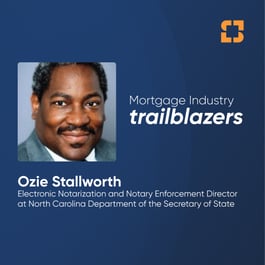This is the first article in a three-part series on Remote Online Notarization (RON). Connect with Whitney and subscribe to the Snapdocs blog to be notified when the next article in this series is published!
Introduction
Remote Online Notarization (RON) represents a transformative shift away from the traditional table closing—turning a historically manual, paper-based process into one that is virtual, secure, and 100% paper-free. In recent years, interest in RON has increased dramatically, largely driven by the need to provide flexible and convenient closing options to customers.
Because RON is a new frontier for many mortgage lenders, there can be confusion when it comes to understanding where and when to apply RON. The great news is that a significant portion of closings are ideal (and eligible) for RON. Today, we’ll be walking through the steps lenders should take to incorporate RON into their business strategy.
RON: Where should lenders start?
Every lender has a unique segment, transaction type, or business focus that is well-suited for RON closings. When preparing to roll out RON, understanding where to leverage RON is the first and most important step.
Don't begin by making this mistake...
It is essential to note that RON should not be considered a “back-up plan” to leverage when all other options have been exhausted (e.g. in scenarios where borrowers cannot meet in person). RON, like any other business strategy, is a skill that is developed with repetition and experience. When RON is considered the “closing option of last resort,” RON efforts can become complicated.
“RON is not a tool to use once in a while or when all other options are exhausted,
RON is a skill that is developed with repetition and experience.”
Imagine a scenario where a loan closing has been difficult to schedule due to signer availability. Over several days, attempts to schedule the closing are unsuccessful—the loan officer is frustrated, the rate lock is expiring, and the borrower’s patience is wearing thin. With no other alternatives available, the closing team decides to try RON. While RON is a very simple and convenient process, it takes practice. In this scenario, the sudden shift to RON means that the closing team must make unexpected changes that can cause confusion and closing delays.
Instead, begin with this approach...
When lenders have a clear RON strategy and rollout plan, these last-minute challenges are easily avoided. Defining a strategic RON approach leads to repetition for all stakeholders and participants. Through this repetition, the team builds confidence and experience in the RON process which ultimately drives successful closings for customers.
Defining a RON strategy starts with two simple steps:
Step 1: Identify the loan types and scenarios where RON fits well into a lender’s business
Step 2: Commit to using RON on as many of those loan closings as possible
Step 1: Identify the right loan types for RON
In this section, we will explore the best transaction types when getting started with RON.
The settlement industry is a great example of how to successfully achieve RON adoption. They focused on transactions that are easy to manage: seller documents and cash sale closings. Lenders should follow a similar approach with RON, starting with straightforward transactions with fewer components that might lead to complications or delays at closing time. Below are our recommendations for the best loans to start with.
Refinances
Without a doubt, refinances are the perfect place to start with RON. Because they are so straightforward, some lenders find refinances a great opportunity to make RON the default closing type. Let’s explore why!
- Rate and term refi: Not only are there fewer stakeholders involved in the closing process (no agents, sellers, etc.), but refinances also offer more flexibility in terms of closing date. With a refinance, borrowers can also choose their title partner, making it easy to select settlement partners that are familiar with RON closings.
- Cash-out refi: RON is particularly well-suited for this closing type thanks to the enhanced security and fraud protection measures involved in the cash-out refi process. These security measures, including KBA, are strong deterrents to potential fraudsters who cannot get past the identity verification requirements.
Investment / Non-Owner-Occupied (NOO) properties
An ideal place to start with purchase transactions is investment properties or vacation/second home purchases. These borrowers are often experienced, savvy investors who value the convenience and flexibility of a virtual closing. It’s common that these buyers are not local to the property being purchased, making in-person scheduling difficult to coordinate. This is a prime opportunity for RON closing.
Captive / high-volume title partners
Lenders that transact a significant portion of volume with captive title is another opportunity to build experience and establish a consistent, repeatable process with RON. In many cases, captive title partners often establish their own RON notaries and prioritize RON as their preferred closing type.
Direct sales channel
Direct sales teams are another great segment for RON. Often focused on refinances or a specific product set, Consumer Direct teams are an ideal group to roll out RON and champion RON as a core business process.
Power of attorney / mailaway desk
When there is a request for a POA or mailaway, the first question should be “Is this loan eligible for RON?” A virtual RON closing avoids the need for a Power of Attorney and eliminates the time and significant risk involved with mailing sensitive documents to a different location. Additionally, investor requirements for POAs are often more restrictive than RON transactions. For these closings, RON is a simpler and more secure closing option that allows borrowers to attend their own closing, instead of sending a representative on their behalf.
Relocation team
RON closings are a great fit for lenders who have relocation teams. Relocations inherently involve multiple geographical locations, which can complicate the buyer’s ability to close in person. RON allows for a flexible closing, regardless of whether the buyer is in transit or unable to be physically present at the closing. Common stories of buyers flying in or making other last-minute closing arrangements are eliminated when RON is an available option.
Similarly, military families are ideal candidates for RON. Military duty requirements commonly result in spouses being in different locations, or limited availability to sign during regular business hours.
RON pilot groups
The best way to start with RON is to focus on ideal transaction types, rather than piloting with a designated group of Loan Officers or a specific branch team. However, there may be instances where a specific sales team or Loan Officer group is highly motivated to use RON for all of their eligible closings. If this is the case, piloting RON with these groups can be effective. At a minimum, this pilot group should meet the following criteria:
- A strong track record of tech adoption (including hybrid closings)
- A high degree of eligibility within their lending footprint states
- Willingness to mandate RON on as many closings as possible
What about primary residence purchases?
You may have noticed we have not mentioned primary residence purchases. Here’s why: purchases are not the ideal place to start with RON closings. Despite being in a heavy purchase market, purchases can be a complicated and highly emotional closing type. Purchase transactions are best for organizations that have established RON programs, with closing teams that have practice and confidence conducting RON.
What makes purchases more challenging? First off, there are many parties involved in a purchase closing, which naturally makes purchase closings more complex. If issues of any kind arise on closing day, each stakeholder is impacted:
- Sellers often purchase their new home the same day, and rely on a successful closing to turn and fund their new home purchase
- A purchase contract and escrow money is tied to the agreed closing date
- Real estate agents are eager to see the transaction closed as planned, so they can hand over the keys to their buyers
- Loan Officers are eager to gain referrals from positive home-buying experiences, which are heavily influenced by the closing
Ultimately, there is less wiggle room or margin for error on a purchase transaction. While the vast majority of RON closings are conducted without issue, just one or two hiccups can undermine willingness to use RON in the future. When lenders roll out RON with the right strategy in place, these potential complications are eliminated.
*Note: ideal loan types will vary based on each lender’s business model and loan portfolio.
Step 2: Ready, Set, RON!
Commit to using RON on as many loan closings as possible. When RON skills are developed and honed with experience, confidence in the process makes for an exceptional outcome. Whether you are just getting started with RON or are looking to restart your RON program, it’s important to find a partner who will help develop a tailored RON strategy that aligns with your business needs and is exciting for your team.
About Whitney Vogt
I work with lenders to help define their RON strategy by sharing my personal insights and experience leading RON operations. I am excited to help lenders leverage this transformative technology in their business and achieve RON success at scale. Ready, Set, RON!
To speak with Whitney directly, you can reach her at whitney.vogt@snapdocs.com.




















